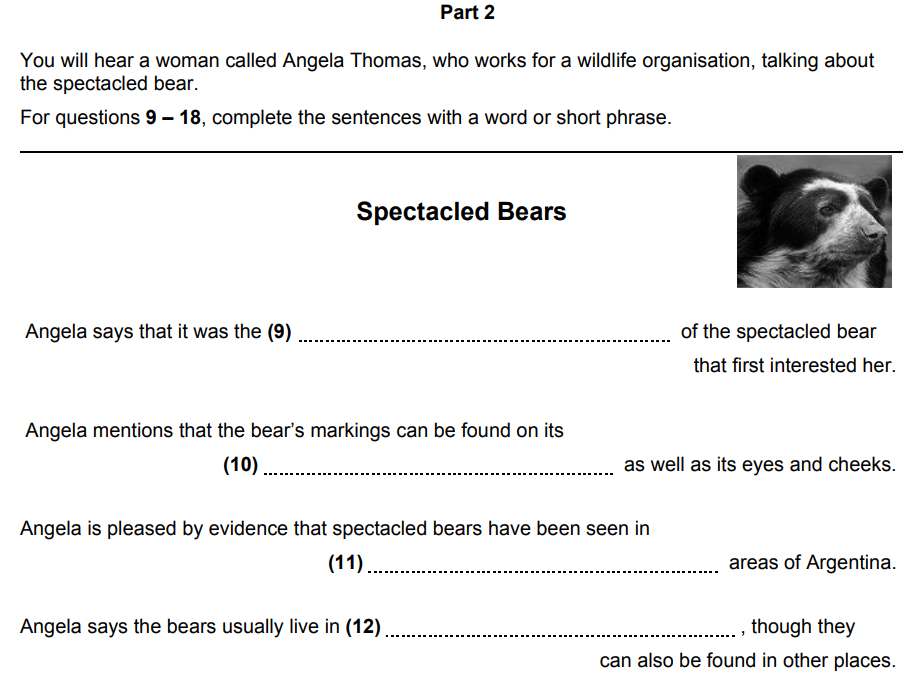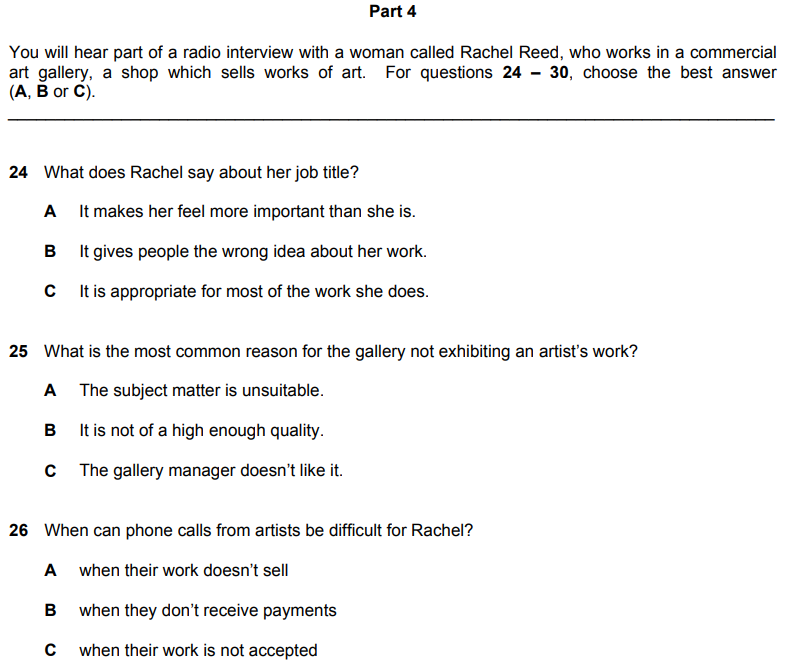
The Cambridge B2 First listening test has 4 parts which will require a different skill set in each to hear the correct answer. There are 30 questions in total and takes about 40 minutes. Each recording is played twice.
In the recordings, you will hear people talk about a variety of subjects and everyday situations. The speakers will also vary in ages and nationalities, which means different accents throughout the exam.
There will be a short period of time before each part to look ahead at the questions. Use this time wisely and think about what kind of situation the recording will be. Try to get the answer on the first listen and double-check your answer on the second listen.
In part 1, you are going to hear 8 monologues or dialogues in many different scenarios and there’s no connection between questions. Generally, you need to find what is the speaker’s opinions, feelings, and reasons about the subject, however it could sometimes be about the action of the speaker.
You have a choice of 3 options to choose from.
Try your best to understand each option and think of synonyms to help you select the correct answer because the speaker is not going to use the exact words on your exam paper, think about the overall context of the listening.

This is a task where you need to complete the sentence with a word (up to 3 words). On your answer paper is a text with ten gaps. You then will listen to a monologue for about 3 minutes and you have to put the missing words or numbers into the text. It looks like this:

As I’ve mentioned before, there will be a short period of time for you to look at the text before the recording starts. Use this time to quickly read the text and make a prediction on what type of word you need.
Does it need a number, adjectives, or a name perhaps….
The recording will correspond and be in the order of the text on the exam paper, however, the sentences on your paper are different from what you hear on the recording. But the words you write should be exactly the same as what you hear. Be careful to read the whole sentence to make sure your answer fits grammatically.

For part 3 of the listening test, you are going to hear 5 short extracts, each from a different speaker, on the same topic. There are 8 options and you have to match the options to the speakers, which leaves 3 options that don’t match any of the speakers.
This part of the exam is about how you understand attitudes and opinions, plus your ability to work out the overall meaning of what someone is saying.

For example, you might hear 5 people talking about traveling, and you have to decide if they find it stressful or fun, worthwhile or pointless.
Listen for the general context of the speaker’s view, and do not just select the answer because the speaker said a word in the answer because, most of the time, that is NOT going to be the correct answer.
And now with part 4, You will hear an interview or conversation (about 3 minutes long) and have to answer 7 multiple-choice questions.

Be sure to read the questions and options carefully, because it is likely that all 3 choices will be spoken about but you need to find the one that question is asking about.
When you’re practicing this before the exam, don’t only try to find the answer. Also, think of why the wrong answers are wrong.
That will help you build the skills you need to do well in the exam in general, but especially for this part.
- Listen out for words that will try to distract you like linking words or phrasal verbs. These can change the answer massively.
- Listening for a long period of time in a foreign language requires a lot of skill, so practice as much as possible by watching a T.V series or film in English.
- During the exam, keep calm. If you didn’t understand one recording, make a guess, and move on to the next one. Never leave an answer blank though.

Once the exam have been completed, B2 First results are then reported on the Cambridge English Scale.
You will receive a separate score for each of the four skills (reading, writing, listening and speaking) and use of English, giving you a clear understanding of your performance. These five scores are averaged to give you an overall result for the exam. You will also be given a grade and Common European Framework of Reference for Languages (CEFR) level.
Feel like you need to practice some exercises? Or want to try out the other parts of the exam?
COURSE BOOKS:


EXAM MATERIALS:


You can contact us anytime. Good luck with your exam!
